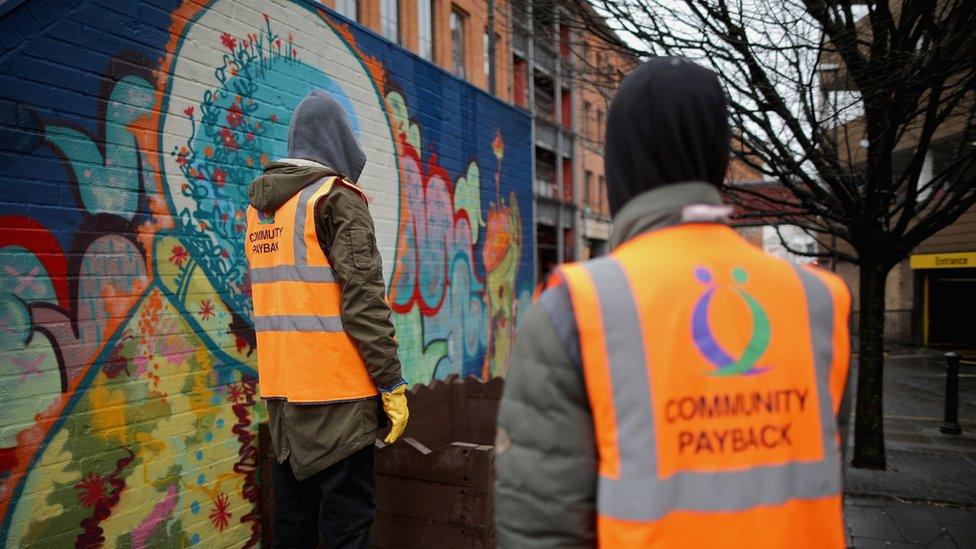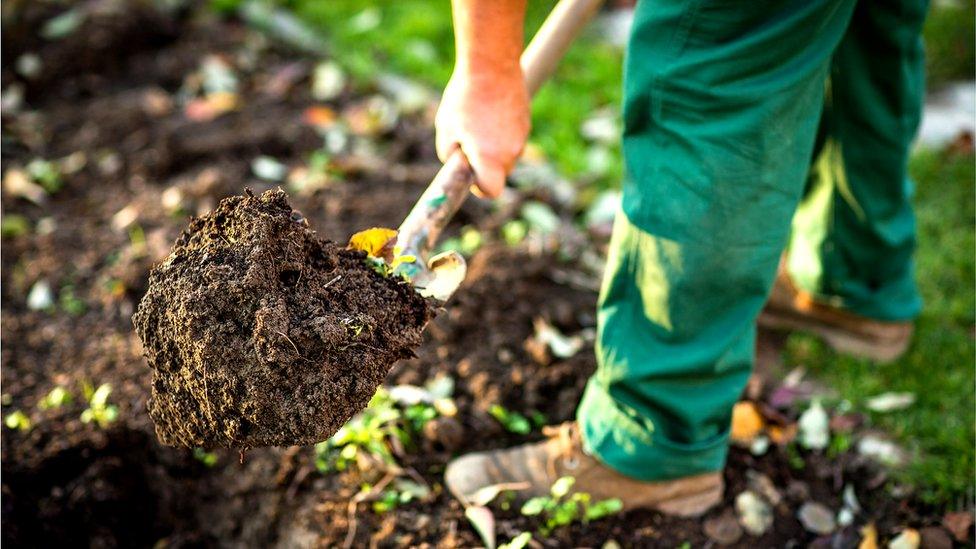Scotland has not met community justice target, says watchdog
- Published

Ministers pledged to shift sentencing to alternatives to prison
A Scottish government target to increase the number of offenders doing unpaid community work has not been met, Audit Scotland has said.
Ministers had pledged to shift sentencing from prisons to alternatives such as community payback orders.
But the report from Scotland's public spending watchdog reveals the use of community sentences has stagnated.
The Scottish government said it was "encouraging more widespread use of community-based interventions".
Figures highlighted by Audit Scotland show that in 2016/17, 59% of sentences handed down by courts - excluding fines - were community sentences such as community payback orders, drug programmes or electronic monitoring.
This dropped to 56% the following year, before returning to 59% in 2019/20.
Stephen Boyle, the Auditor General, said: "Reducing reoffending by shifting the balance of sentencing from prison to the community has the potential to reduce the costs to the individual, taxpayer and wider society.
"But that Scottish Government aim hasn't yet been achieved."
Scottish Government analysis suggests community sentences have a positive effect on both the reoffending chances of the perpetrator and the public purse.
In 2016/17 that the cost of housing a prisoner in Scotland was, on average, £37,344 compared to a cost of just £1,894 for community sentences.

The Scottish government said it was encouraging more "community-based interventions"
Of those released from a sentence of less than 12 months, 49% went on to reoffend in the first year, while just 29% of those given a community sentence offended again.
But the use of community sentences varied wildly depending on the local authority area, with just 15.9 community payback orders per 10,000 of the population in East Renfrewshire, compared to 68.7 in Clackmannanshire.
Responding to the report, Karyn McCluskey, chief executive of Community Justice Scotland, welcomed Audit Scotland's "recognition that community justice can be transformative for individuals and communities".
She added: "We must imprison those whom we are afraid of, and not those we are mad at. People enter our justice system with mental health issues, addiction problems, homeless, from the care system and many who've been victimised as children.
"Addressing problems and solutions in a community setting is key to transforming lives - both of victims and those who have offended. We should have the confidence that we can do this consistently and to a high standard across Scotland."
Scottish Conservative justice spokesman Jamie Greene highlighted that more than a third of unpaid work hours in community payback orders have been written off.
The West Scotland MSP said: "The SNP government has failed to implement robust community sentences. Before the pandemic, the number of completed work requirements in community sentences was at its lowest level for seven years.
"The SNP should stop pursuing their failed alternatives to prison and start toughening up the justice system instead."
'Restorative justice'
Labour justice spokeswoman Pauline McNeill added the report should be a "wake-up call" to the Scottish government.
She said: "Community justice, particularly for those who have not been convicted of a violent crime, must become more widely used."
Scottish Greens justice spokesperson Maggie Chapman said: "We need to change the whole approach in Scotland, focusing on community sentences and restorative justice.
"Jailing people who don't need to be jailed happens too often and has enormous costs on the individual, on society and to the public."
Funding for prisons is around three times that for community justice.
In 2021/22, £460m of Scottish government money was allocated to prisons and £133m to community justice.
A Scottish government spokesman said: "While sentencing decisions in individual cases are a matter for the independent courts, we are committed to encouraging more widespread use of community-based interventions where appropriate.
"These are often more effective at reducing re-offending, as Audit Scotland sets out and for keeping our communities safe.
"Our firm focus on prevention and effective community interventions has helped see Scotland's reconviction rate fall to its lowest level since comparable records began more than 20 years ago."